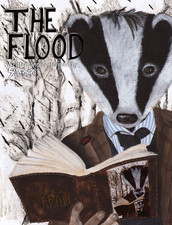Unthology #3
-Reviewed by Charlotte Barnes–
Unthology 3, the third short story anthology to be released in this series by Unthank Books, is kicked into gear with an introduction that claims, “In these uncertain, frightening and recessionary times… it’s only natural to want to switch off the daily terror and hide in a warm fantasy.” The statement immediately lulled my mind into believing that what may be on offer in this new collection was warm fantasy, though that statement also concludes with ‘there is some sex in it’, so it seems the anthology offers something for a wide scope of readers.
There was however a slight pang of confusion upon reading the opening story, ‘Terra Cotta’ by David Rose; the narrative, which weaves readers through a maze of artistic creations as we find ourselves on the tour of a gallery, is not only original and complex, but also maximises the opportunity to explore the visual side of literature through vivid, convincing and all-round inspired descriptions. Having said that, I couldn’t help but feel somewhat underwhelmed by the overall premise of the story, particularly after I had prepared myself for something much more fantasy-based. ‘So Long Mariane’, by Sandra Jensen, completely redeemed this initial reaction, and explained that this was much more than a collection of fantasy tales, with a relevant tale that begins with, “When Mariane asked me to help her kill herself, I thought it would be relatively easy.” The first person narrative provides a gut-wrenching insight of the perspective of someone playing party to euthanasia. Jensen’s narrative, with infrequent and unmarked speech, revolves mainly around the accomplice and the emotional effects, allowing a truly unique voice to become apparent through the inspired tale.
At a later stage in the collection you will discover ‘Even Meat Fill’ by Gordon Collins. My initial reading of this story left me feeling a little underwhelmed and admittedly, slightly confused. However, after returning for a second reading, I eventually found myself bowled over by not simply the story but the narrative used to articulate it. The introductory paragraph to the piece is repeated throughout, which either accidentally or deliberately, perfectly complements the repetition that can be noted in the action the paragraph itself depicts. The story, through the use of this significant paragraph and the repetitive actions that are addressed, succeeds in telling a tale while clearly capturing the monotony of every day life and, I suppose, every day work. This is followed by ‘The Triptych Papers’ by Ian Chung, which is definitely a personal favourite from the whole collection. The story is broken down into parts, allowing for different narrative voices to be exploited and ultimately collaborate towards an eerie, perhaps even science fiction style piece. Similarly, ‘Before the Song’ also benefits from shifts in narrative allowing for the perspective of each member of a family to be voiced throughout.
‘Paradise’ by Sharon Zink and ‘Trans-Neptune’ by Ashley Stokes, which I will refer to as the relationship stories of the collection, cater to the promise of sex offered during the introduction. ‘Trans-Neptune’, which is significantly longer than other stories in the collection, presents a fairly normal situation (a woman, under-nurtured by her husband, contemplates finding sexual attention elsewhere) however still manages to offer something special through the complicated narrative voice that, despite toying with the idea of infidelity, seems to offer readers something familiar that they may even relate to.
‘A Publisher Surveys the Changing Literary Scene’, by CD Rose, caused a definite smirk for me, as a committed book reader. The detective tone of the piece truly throws you off track whilst addressing regular elements of the publishing industry in a unique and inevitably amusing manner. Skipping ahead again leads to ‘The Theory of Circles’ by Debz Hobbs-Wyatt which is a truly fascinating story executed through the use of a unique, modern and inspired narrative style. The story is told through a series of prose-written paragraphs, Facebook updates, Twitter updates and blog posts which keeps the reader continuously guessing about the next twist of the narrative style. The use of repetition in language contributes to this further by expanding on the circular idea that suggests itself in the title and lingers throughout the body of the text.
Another clever manipulation of literary techniques is embedded within ‘My Oldest and Dearest Friend’ by Charles Wilkinson; the story seems to follow an unexpected avenue which involves two major characters being calmly murdered by their partners, however the shock is quickly snatched away by the reality that they are all in fact uncomfortably devouring dinner together at the close of the story. An equally fascinating style is presented in the final story ‘Eleanor: The End Notes’ by David Rose, in which the narrator guides us through a tragic love story, which on its own probably offers nothing particularly unusual; however it is an experience heightened greatly by the tendency to directly address the reader through asides such as “(you know the passage, I’m sure)” which inevitably draws in a reader, making the story much more intense and involving.
The collection unquestionably offered a welcome break and did indeed usher me into a world of warm fantasies, although some authors achieve this much more effectively than others. While some contributors to this collection opted to explore a world of fantastic, original and sometimes unbelievable ideas, others, such as Sarah Evans in ‘Terms and Conditions’, addressed real life issues in a touching way, without dressing it up with an overly complicated narrative and such like, which certainly isn’t a criticism. The entire publication was a welcome escape from reality, or in some cases a look at reality through new eyes, and I sincerely hope that there will be a fourth addition to this series in the future.




Pingback: UNTHOLOGY No.3 « Ashley Stokes
Pingback: Winter News at Notes Along the Way
Pingback: Saboteur Awards 2013: The Shortlist | Sabotage
Pingback: Saboteur Awards 2013: Fiction | Sabotage